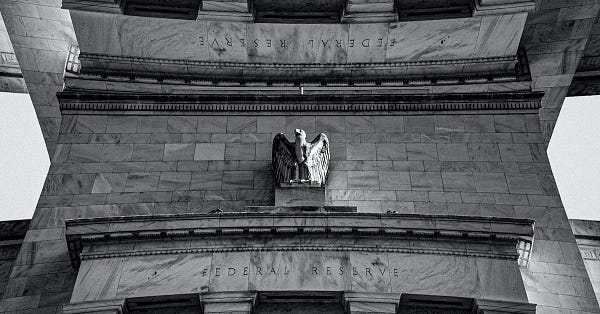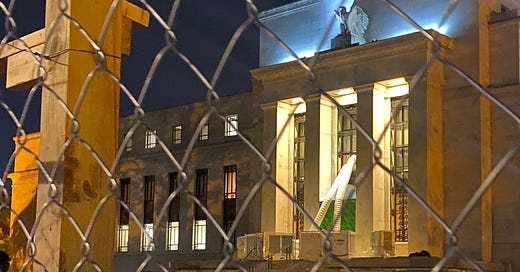Congress must rein in the Fed
The Fed continues to raise interest rates aggressively, making it costly for Americans to defend democracy in Ukraine and threatening a recession. It's time for Congress to act.
The independence of the Federal Reserve is Congress-given, not God-given.
The “independence” of the Fed from Congress and the White House is considered sacrosanct at the Fed. It’s not. And in times of war, the three have coordinated.
During World War II, the Fed, at the request of the U.S. Treasury, kept interest rates low to limit the costs of funding the war. We have a war in Europe now, and the Fed is making it more expensive.
“When the United States entered the war, the Board of Governors issued a statement indicating that the Federal Reserve System was “. . . prepared to use its powers to assure at all times an ample supply of funds for financing the war effort” (Board of Governors 1943, 2). Financing the war was the focus of the Federal Reserve’s wartime mission. This mission differed from the mission of the System before and after the war.
To keep the costs of the war reasonable, the Treasury asked the Federal Reserve to peg interest rates at low levels. The Reserve Banks agreed to purchase Treasury bills at an interest rate of three-eighths of a percent per year, substantially below the typical peacetime rate of 2 to 4 percent. The interest-rate peg became effective in July 1942 and lasted through June 1947. The rates remained in effect until January 1948.
Congress decides what the Fed’s responsibilities are, and containing inflation is only one of them.
Congress created the Fed in 1913 as a lender of last resort and, in 1977, gave the Fed a dual mandate of maximum employment and stable prices. Congress can tell the Fed what to do, even if only until the war in Europe ends.
Founded by an act of Congress in 1913, the Federal Reserve System was established with several goals in mind. Perhaps most important was to make the American banking system more stable. [Often referred to as “lender of last resort.”] Banking panics—events characterized by widespread bank runs and payments suspensions and, to a degree, outright bank failures—had occurred often throughout the 19th century.
The Federal Reserve Act mandates that the Federal Reserve conduct monetary policy "so as to promote effectively the goals of maximum employment, stable prices, and moderate long-term interest rates."1 Even though the act lists three distinct goals of monetary policy, the Fed's mandate for monetary policy is commonly known as the dual mandate. The reason is that an economy in which people who want to work either have a job or are likely to find one fairly quickly and in which the price level (meaning a broad measure of the price of goods and services purchased by consumers) is stable creates the conditions needed for interest rates to settle at moderate levels.
The Fed will break something, preventing us from fighting inflation and risking immense damage to the world.
The Fed’s rapid and large rate hikes are destabilizing financial markets. The Treasury market is vulnerable to adverse events like a debt ceiling showdown. The Fed’s current actions are reckless.
Here’s me on financial markets and the risks of a debt ceiling showdown:
The best tool we [the Fed] should be using right now is patience. Financial markets are clearly fragile, and the Fed is putting an immense pressure on the economy.
There are things Congress needs to avoid doing. I was disconcerted, but not surprised, when I saw some of the saber-rattling about the debt ceiling. The last thing we need is for them to play chicken on the debt because, again, the Fed is fighting inflation and trying to get this thing back on track.
It’s kind of like we’re in a china shop. The Fed has contributed to that, but they’re not the only ones — Covid and Putin get a lot of credit, and they are making things more and more fragile. Every time a policymaker releases a bull into the china shop, bad things happen. The UK is a canary in the coal mine. If Congress does not raise the debt ceiling, that’s another bull, and it will take the eye off the ball on inflation. Unforced policy errors just can’t happen right now. Congress and the White House need to be awake at the wheel. Really, everybody needs to be boring and just do what they normally do.
Here’s Nellie Liang, Undersecretary at Treasury for Domestic Finance:
The Treasury market plays a critical role in financing the federal government, supporting the broader financial system, and implementing monetary policy. To ensure the Treasury market continues to fulfill these vital purposes, the official sector needs to seek continual improvements that strengthen the Treasury market and keep pace with changing technology and trading patterns.
In addition, amid the increase in economic and market volatility since the beginning of the year, reduced market liquidity has served as a daily reminder that we need to be vigilant in monitoring market risks. While the Treasury market continues to operate through today’s macro uncertainties, episodes of market stress, for example in March 2020, September 2019, and October 2014, underline the importance of understanding market vulnerabilities and exploring ways to enhance Treasury market resilience.
If they continue, the aggressive rate hikes this year will push financial markets to a breaking point. Treasuries are a likely candidate. A well-functioning market for U.S. government debt is essential for funding the military aid for Ukraine, policies to fight climate change and basic services like Social Security. The Fed is out of line, and it is time for Congress to tell the Fed to stop.
More links on the Fed and inflation
Here’s my interview with The Intercept, an independent news organization, on the Fed’s policy now:


As my thread explains, Larry’s logic is flawed, and his advice is reckless.


Finally, here’s an excellent explainer video on inflation by Andrea Miller at CNBC. Julia Pollack, Mark Zandi, and I are featured.
Wrapping up
Today, at its November meeting, the Fed will hike another 75 basis points; in December, it could raise by another 75 basis points. If so, the Fed would have raised rates from zero in March to 4.5% by year’s end. That’s an incredible strain on financial markets, the U.S., and the global economy. It must stop.





What a foolish post. You supposedly worked for the Fed, yet you are a complete fantasist. Yep, let's pause the hikes because Claudia said so and let inflation spiral out of control. Maybe they should reignite QE too.
Claudia, my agreement or disagreement aside, you ignore the fed-congressional tension of the early-80s, which is the time that's brought up in reference to unhinged inflation expectations. Congresspeople at the time argued, much like you're arguing today, that Volcker should step down, the fed should lose independence. In turn, Volcker went ahead with tightening despite the fact that he might lose the chair due to political concerns. 50 years later and we herald Volcker's decision as saving the US economy--perhaps an oversimplification.
Would you care to add this context to your argument? Your argument explicitly must include the history of this event if you're going to argue that congress should influence the fed today. Why should the fed be politically driven today when such action might have completely derailed Volcker's efforts in the early-80s? If Volcker was right in the 80s, Congress was wrong in the 80s. We experienced short term pain for long term pleasure. Are you arguing the opposite? What evidence do we have that congress has the economic acumen if the fed does not?